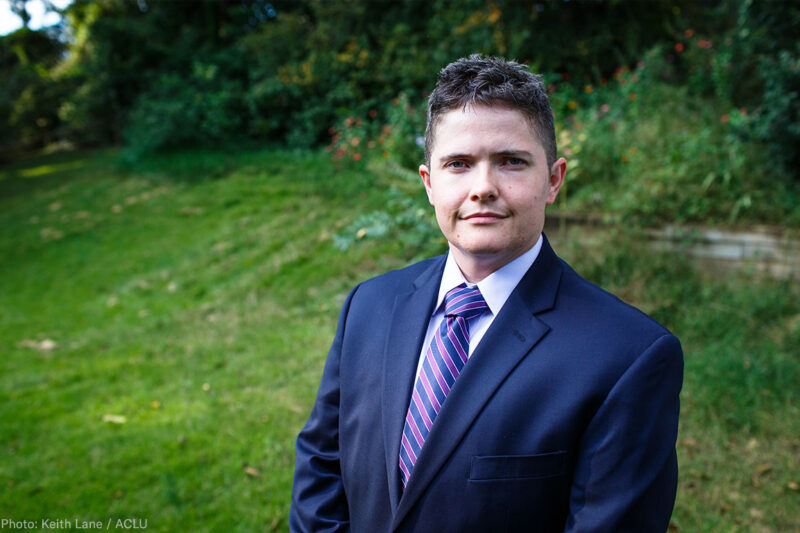Transgender Soldiers Are Equal to the Task. We Have Earned the Right to Serve Our Country.


This article is an expression of my personal opinion as a private citizen, and in no way reflects that of the United States Navy, the government, or affiliated agencies and organizations.
My name is Brock Stone. I am a Petty Officer First Class in the United States Navy, and I have been serving for 11 years. I’ve set foot in nine different countries, deployed to Afghanistan, and worked alongside some of the most amazing and diverse people our country has to offer. I also happen to be a transgender man.
I decided to join the Navy in 2005, inspired by my father’s service and that of many other family members and friends. Right away, I had my work cut out for me, as I had to work hard for several months to fit the physical fitness standards the Navy required. I was finally able to join in 2006 at the age of 23. It was an intimidating step into my future, but I had decided well before the day I was sworn in that I was going to serve for at least 20 years.
On my in-processing day, I recall very vividly signing a piece of paper acknowledging the “don’t ask, don’t tell” (DADT) policy: a rule that stated the military agreed to not ask about my sexual orientation, but that I was not to be involved in any “homosexual behavior.” I considered myself bisexual at the time, so I rationalized to myself that I was still left with some dating options, and signed on the line. My gender identity, I’d already buried under a pile of denial in college.
That denial didn’t last long, however. A few years into my service, and I was struggling with a lot of frustration and anger, and even after I stopped denying my gender identity I still had to stay closeted in public. Even when DADT was repealed, trans people were left behind. I turned to cosplay and geek culture to escape a little, but I often wished I didn’t have to wear my real self as a costume. The one bright spot was my wife, whom I met at a convention in 2015, and who immediately accepted me for who I was. Thanks to the DADT repeal, we were, at least, able to marry.
Despite the wide acceptance I enjoyed in my personal life and among my friends, I still lived in fear. Telling the wrong person or posting the wrong thing on social media could mean the end of my career. I hated the idea of living a lie. Honor is a core value within the Navy, and hiding who I was didn’t feel honorable, even though it had no material impact on my ability to serve.
By the spring of 2016, I was almost at my wit’s end. Although I excelled at work and received high marks in performance, being at work was becoming increasingly frustrating. I was virtually living a double life.
Even though by then the power to discharge trans people had been removed from Navy unit commanders, I stayed closeted because it was still technically possible for me to be processed out.
Then on June 30, 2016, then-Secretary of Defense Ashton Carter announced that the military was halting its ban on allowing service men and women who are transgender to serve.
I watched his press conference in my truck in a shopping mall parking lot, afraid to miss even a second of it. It was a pivotal moment for me. I was finally free, finally safe, finally able to fully excel without fearing for my career.
Moving forward with my transition is incredibly liberating. I feel even more motivated at work, helping my Sailors, and serving my country. While I don’t pretend to speak for all my fellow trans servicemembers, I have heard similar sentiments from many of them. My unit, command, and fellow servicemembers have been incredibly supportive.
So, of course, it was shocking and hurtful to hear of the transgender service ban. All the old fear and anxiety came flooding back, along with a sense of betrayal. I had, in good faith, made myself known. I had been granted license to be myself. And then, just a little more than a year later, that was all taken back.
Now, I wonder whether I’ll be able to continue my career. I must plan for a future that is uncertain and a course which could dramatically change in just a few months. I worry for my family.
I remember the first time someone thanked me for my service. I was flustered and didn’t know what to say. Then, my father reminded me of something: It’s my privilege. Privileges are something to be grateful for, something granted by others. Privilege is also earned.
I am fully committed to the ŔĎ°ÄĂĹżŞ˝±˝áąű’s lawsuit challenging the ban allowing trans service men and women to serve, but it took some convincing for me to agree to be a plaintiff. I never wanted a spotlight, I never wanted to be a hero.
But anyone can look at my service record, and the records of other trans servicemembers like me, and see that we have earned the privilege to continue serving our country so long as we continue to be fit for duty. We are equal to the task, and it is our right to have an equal chance to take that task on.

